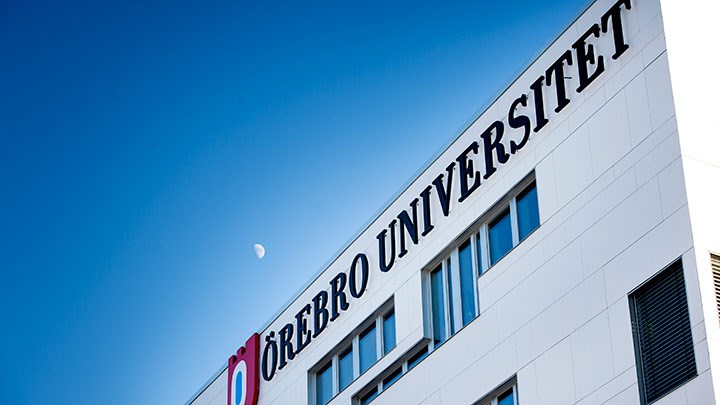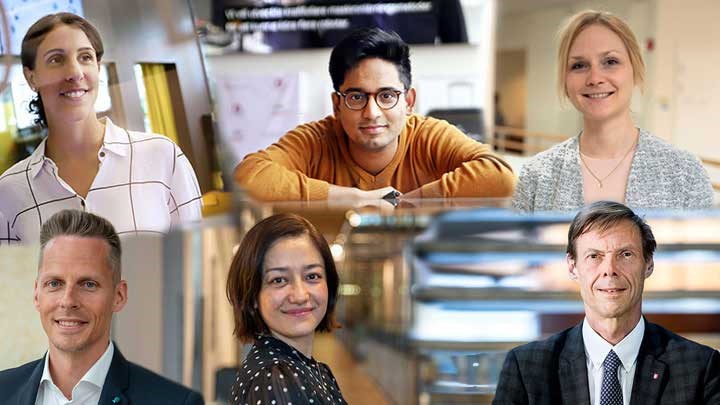Associate senior lecturer in Computer Science, Cybersecurity
Ref no: ORU 2.1.1-03064/2025
Örebro University and the School of Science and Technology are looking for an associate senior lecturer (tenure track) in Computer Science, specialising in Cybersecurity for a fixed-term position of 4-6 years at the School of Science and Technology.
Subject area
The subject area for this position is Computer Science.
Background
The appointed applicant will be part of the Wallenberg AI, Autonomous Systems and Software Program (WASP). WASP is Sweden’s largest individual research program ever, a major national initiative for strategically motivated basic research, education and faculty recruitment. The program addresses research on artificial intelligence and autonomous systems acting in collaboration with humans, adapting to their environment through sensors, information and knowledge, and forming intelligent systems-of-systems. The vision of WASP is excellent research and competence in artificial intelligence, autonomous systems and software for the benefit of Swedish society and industry. Read more: https://wasp-sweden.org/
The position will be placed at the Department of Computer Science within the School of Science and Technology, and will carry out research within the field of cybersecurity. You will contribute to the further strengthening of our profile in the area of cybersecurity through productive independent research, research supervision at all levels, participation in departmental and university-wide activities, application for external funding, and collaboration with research groups within and outside Örebro University. The position includes a maximum of 20 % departmental and teaching duties at BSc, MSc, and PhD levels. As a WASP-funded position, we are interested in applicants with strong potential connections to the WASP program in any of the areas of AI and cybersecurity.
Duties and responsibilities
During your period of employment as an associate senior lecturer, you are to develop your autonomy as a researcher and acquire further qualifications in terms of both research and teaching skills to meet the criteria for a position as a senior lecturer.
Duties and responsibilities include research, education at all levels, and collaboration. An appointment as an associate senior lecturer at Örebro University is mainly focused on the acquisition of research qualifications (at least 50 % of the working hours). The rest of the working hours are primarily geared towards the acquisition of teaching qualifications. As an associate senior lecturer, you are also to contribute to the university’s development.
The recruited associate senior lecturer is expected to take part in WASP and its activities, such as the annual conferences and teaching doctoral courses within the WASP offering. As previously stated, the position requires a total maximum of 20 % of departmental and teaching duties, including courses at every level (BSc, MSc, PhD).
Qualifications
Those qualified for appointment as an associate senior lecturer are applicants who have been awarded a doctoral degree in a subject area relevant for the position or have the corresponding research competence. Preference should be given to those who were awarded a doctoral degree or attained equivalent research competence no more than seven years prior to the application deadline. If special grounds exist, a person who has been awarded their doctoral degree prior to that should also be considered. Such grounds comprise leave of absence due to illness, parental leave, or other similar circumstances.
Assessment criteria
When appointing an associate senior lecturer, the applicant’s research as well as teaching expertise will be assessed. The assessment is also to consider the applicant’s qualifications and experience from collaboration with the wider community, of which the university is a part, as well as national and international experience and mobility. Teaching staff is expected to have the ability to communicate, to collaborate with the surrounding community and to contribute to utilising the university’s research for the benefit of society. In addition, the applicant’s suitability for the position will be assessed.
Research expertise
The assessment of the applicant’s research expertise is based on their research qualifications, with regard to both the quality of the doctoral thesis and publication output or works in progress after the doctoral thesis, in relation to the disciplinary traditions of the post applied for. Assessed is also applicants’ ability to conduct research autonomously and the ability to develop and lead their own research. The applicant is expected to confirm their intention to engage in future research activities.
Preference will be given to candidates with a strong background and publication record in one or both of the following fields: adversarial AI and cyber-physical system security. In terms of publications, it is a strong merit to have at least 4 publications in top cybersecurity venues, such as ACM CCS, IEEE S&P, NDSS, Usenix Security, IEEE TIFS, IEEE TDSC, ACM TOPS, or at least 8 publications, including also other venues, such as Euro S&P, AsiaCCS, ESORICS, ACNS, ACSAC.
Teaching expertise
At Örebro University, teaching expertise is assessed in the categories teaching approach, teaching approach in practice, and professional development as a teacher. Applicants’ teaching qualifications shall be documented in accordance with Örebro University’s template for teaching portfolios and clearly relate to Örebro University’s educational philosophy. The fact that applicants who have recently obtained their doctoral degree may only be able to demonstrate limited teaching expertise should be particularly considered in the assessment.
The assessment of applicant’s teaching expertise is based on the breadth and scope of various forms of working and teaching at the bachelor’s and master’s levels, including experience of supervision. In addition, applicants’ ability to plan, implement and evaluate teaching and examination formats is assessed. Applicants’ ability to link teaching to research and contribute to a scientific approach in their teaching will also be assessed.
Preference will be given to candidates with a previous teaching experience in cybersecurity-related courses, possibly as a course responsible or at least at the level of teaching assistant.
Collaboration and public engagement skills
The ability to interact with the surrounding society is an important part of a university teacher’s role and it requires a good understanding of various societal processes and the impact of university activities on these. Assessment of collaboration and public engagement skills looks at three aspects: the ability to communicate, the ability to collaborate with the surrounding society, and the ability to facilitate utilisation of the university’s research.
Leadership skills
In assessing leadership and administrative skills, particular consideration should be given to leadership qualifications within education and research, such as contributions to development work. Depending on the specialisation and duties of the appointment, qualifications from operations outside of the higher education sector may be considered. The fact that applicants who have recently obtained their doctoral degree may only be able to demonstrate limited leadership skills should be particularly considered in the assessment.
Suitability
Suitability refers to the applicant having the personal qualities required to successfully perform the duties and responsibilities at hand, to cooperate with other members of staff, and to contribute to the development of the operations in question. The applicant shall also have an interest in development work and the ability and desire to embark on an academic career.
A successful applicant should have the ability to work autonomously, show strong and independent problem-solving skills and critical analytical abilities, and a passion for cybersecurity research in advanced and futuristic topics. A successful applicant should also demonstrate strong interpersonal skills, the ability to work collaboratively with colleagues from diverse backgrounds, and a commitment to respectful and ethical professional behaviour.
Other assessment criteria
Strong merit is the evidence of past involvement in industry-academia collaborations and projects, as well as research valorization activities, such as patents, spin-offs, and public dissemination. Similarly, strong merit will be given to applicants showing past involvement and success in grant/funding applications. National and international awards will also be positively considered. Last, but not least, we appreciate the involvement of the candidate in research group activities and in the international scientific community (e.g., conference organisation and chairing, TPC memberships, etc.).
Promotion to senior lecturer
An associate senior lecturer is on application and assessment to be promoted to senior lecturer if they meet the criteria for the appointment.
A condition for promotion is that there is a need within the organisation in the subject area in question and that a separate assessment of the candidate’s qualifications is made. The basis for promotion from associate senior lecturer to senior lecturer is that the applicant meets (1) the criteria set out in the requirements profile at the time of appointment as associate senior lecturer, and (2) the qualifications and assessment criteria in place for appointment as senior lecturer at the time of promotion and based on the respective faculty board’s guidelines for appointment. On the examination of an application for promotion to senior lecturer, teaching and research/artistic expertise are to be given equal attention. In addition, on promotion, the applicant must have completed qualifying courses on teaching and learning in higher education. They must also demonstrate good oral and written communication skills in Swedish at the level required to perform common duties within research, education, and administration.
The application for promotion to a position as senior lecturer is to be submitted to the faculty no later than 6 months and no earlier than 12 months before the employment as an associate senior lecturer comes to an end. Such a promotion entails permanent employment as a senior lecturer in the subject.
Information
This is a fixed-term full-time position for a period of 4-6 years (the exact length will be decided in connection with the appointment). The appointment may be extended, but for no longer than two years, because of the associate senior lecturer’s illness, parental leave, or other special grounds, additional time is needed to fulfil the purpose of the appointment. At Örebro University, salary depends on the successful candidate’s qualifications and experience.
For more information about the position, contact Prof. Mauro Conti (mauro.conti@oru.se). For administration issues, contact Prof. Martin Magnusson (+46 19 303870, martin.magnusson@oru.se).
At Örebro University, we expect each member of staff to be open to development and change; take responsibility for their work and performance; demonstrate a keen interest in collaboration and contribute to development; as well as to show respect for others by adopting a constructive and professional approach.
Örebro University actively pursues equal opportunities and gender equality as well as a work environment characterised by openness, trust and respect. We value the qualities that diversity adds to our operations.
Application
The application is made online. Click the button “Apply” to begin the application procedure.
For the application to be complete, the following electronic documents must be included:
- Covering letter, outlining how you believe you can contribute to the continued development of Örebro University
- CV with a relevant description of your overall qualifications and experience
- Teaching portfolio (as instructed in Örebro University’s guidelines)
- Research portfolio
- Publication list
- Relevant scientific publications (maximum of 10 and in full-text format)
- Copies of relevant course/degree certificates and references verifying eligibility and criteria met
Only documents written in Swedish, English, Norwegian and Danish can be reviewed.
More information for applicants will be found on our career site.
The application deadline is July 31, 2025. We look forward to receiving your application!
After the application deadline, no supplements can be made electronically. If you have scientific publications that cannot be attached electronically to the application, you will, once the external experts have been appointed, receive instructions on how the missing publications can be submitted.
As we have already made our choices in terms of external collaboration partners and marketing efforts for this recruitment process, we decline any contact with recruitment agencies and advertisers.
As directed by the National Archives of Sweden (Riksarkivet), we are required to deposit one file copy of the application documents, excluding publications, for a period of two years after the appointment decision has gained legal force.




